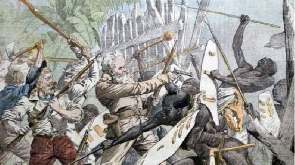German president say "shame" dey catch am for all di bad- bad tins wey im kontri do for Tanzania during di colonial days.
Tori be say for early 1900s, German forces kill almost 300,000 pipo during di Maji Maji kasala wey happun, dat kasala na one of di bloodiest anti-colonial fight.
President Frank-Walter Steinmeier bin tok dis for one museum for Songea, wia di kasala bin happun.
"I go like ask for forgiveness for wetin Germans do to una ancestors hia," E tok.
"Wetin happun hia na history wey we share, di history of una ancestors and di history of our ancestors for Germany."
Di Maji Maji kasala start sake of one German policy wey force di kontri pipo to grow cotton for export.
Tanzania bin dey part of German East Africa, wey now be modern-day Rwanda, Burundi and parts of Mozambique.
President Steinmeier say im hope na say, Tanzania and Germany fit work towards "communal processing" of di past.
I promise to "take di stories wit me to Germany, so more pipo for my kontri go know about dem."
Germany, until recently, bin get "colonial amnesia", e mean to forget dia colonial history according to Jürgen Zimmerer, one history professor for University of Hamburg.
"Di brutality and di racism of di colonial empire, German public no understand am."
As part of di three-day visit, di president bin meet di relatives of one of di Maji Maji leaders, Chief Songea Mbano, na one of di pipo wey dem kill for 1906.
For Tanzania dem see am as a national hero and President Steinmeier tell di family say German authorities go try to find im dead bodi.
Tori be say dem bring thousands of deadi bodi dem from German colonies - partly as "trophies" but also for racist research.
Prof Zimmerer say "funding no really dey " available to identify wia these bones and skulls, wey dey for different museums or institutions, actually come from.
Some of di relatives of those pipo wey dem kill don manage to locate dem wit di help of DNA tests.
On Tuesday, afta im meeting wit President Samia Suluhu Hassan for Dar es Salaam, im promise say Germany go co-operate wit Tanzania to "bring back dia cultural property".
Tanzania historian Mohamed Said welcome di president apology but tell BBC say e no go far enough.
"Dem decide to set farms on fire so pipo no go get food and dem no go fit fight. Dis dey unacceptable, for today world dem for carry dem go court," e tok.
Oda times european kontries don tok sorry for dia colonial past
For 2021, Germany officially admit say dem commit genocide during dia occupation of Namibia and dem announce financial aid wey worth more than €1.1bn (£940m; $1.34bn).
Britan King Charles also recently acknowledge di "bad and unjustifiable acts of violence wey dem bin commit against Kenyans" during dia independence struggle, during im recent visit to Nairobi.
But, di British monarch no give formal apology dat formal apology na goment ministers go decide am.
Meanwhile, Belgium bin come out to address dia colonial abuse to Democratic Republic of Congo for 2020.
Belgium king Phillipe express im "deepest regrets" to di African kontri for im kontri colonial abuse to dem.
Di reigning monarch tok inside one letter to President Félix Tshisekedi for di 60th anniversary of DR Congo's independence.
Belgium bin control di central African kontri from di 19th Century until dem gain independence for 1960.
Millions of Africans bin die during Belgium bloody colonial rule.
Some European kontries also don apologise for dia historical role for slave trade. Netherlands, Denmark, France, UK and di European Parliament don issue apologies or officially recognise slavery and di slave trade as crimes against humanity.
Former Pope John Paul II also apologise for di church role inside slavery.
BBC Pidgin of Thursday, 2 November 2023
Source: BBC
Why Germany ask Tanzania to forgive dem
Entertainment















